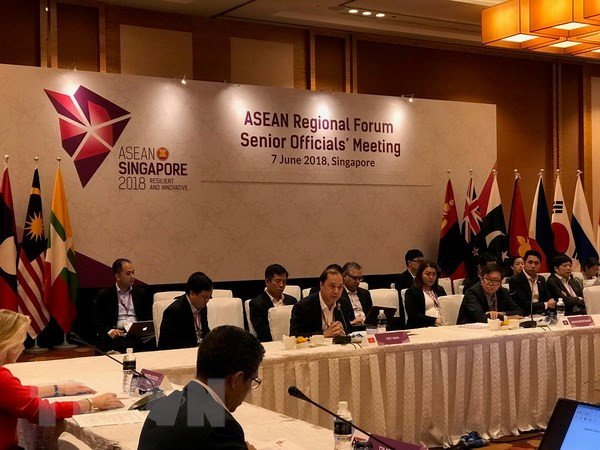 Deputy Foreign Minister Nguyen Quoc Dung (front, second, left), head of the Vietnamese delegation, speaks at the senior officials’ meeting of the ASEAN Regional Forum (Photo: VNA)
Deputy Foreign Minister Nguyen Quoc Dung (front, second, left), head of the Vietnamese delegation, speaks at the senior officials’ meeting of the ASEAN Regional Forum (Photo: VNA)Singapore (VNA) – Senior officials’ meetings within the framework of the ASEAN+3, the East Asia Summit (EAS) and the ASEAN Regional Forum (ARF) took place in Singapore on June 6 and 7.
The Vietnamese delegation to the events was led by Deputy Foreign Minister Nguyen Quoc Dung.
At the meetings, senior officials of ASEAN and partner countries shared the view that cooperation within the framework of ASEAN+3, the EAS and the ARF continued to obtain major outcomes.
Building on the progress attained since the 20th founding anniversary of ASEAN+3 in 2017, the cooperation between ASEAN and China, Japan and the Republic of Korea has developed strongly, especially in economy, trade, finance, food, health care, education, and cultural and people-to-people exchange.
In the face of regional and global economic changes, the countries agreed to further enhance regional economic connectivity, particularly by soon finalizing negotiations on the Regional Comprehensive Economic Partnership (RCEP), make efforts to effectively carry out existing programmes and work plans, including the ASEAN+3 Cooperation Work Plan for 2018-2022, and focus on priority fields like supporting small- and medium-sized enterprises, developing e-commerce, and building smart cities.
Regarding the EAS, the countries reaffirmed the importance of the EAS as a forum for leaders to talk about big strategic issues of shared concern. Accordingly, to implement high-ranking agreements, they will continue cooperating in the agreed priority fields like energy, education, finance, health care, environment, disaster response, and connectivity.
Notably, the officials spoke highly of the approval of the Manila Plan of Action for 2018-2022 in April 2018, which includes new priority fields like maritime cooperation, and agreed to ensure the effective implementation of this plan. The meeting also considered some proposals on bolstering cooperation in smart city building, counter-terrorism, preventing plastic waste in the sea, and nuclear security.
At the ARF senior officials’ meeting, the countries discussed and reached consensus on many measures for building trust, promoting preventive diplomacy, and reinforcing ties to cope with emerging challenges, including those in cyber security, marine security, counter-terrorism, disaster aid, and aviation security.
Talking about global and regional issues, the officials applauded the recent progress in the Korean Peninsula, including inter-Korean summits, and affirmed their support for peace, stability and denuclearization in the Korean Peninsula. They also said they looked forward to fine outcomes of the summit between the US and the Democratic People’s Republic of Korea, slated for June 12 in Singapore.
With regard to the East Sea situation, they emphasised the importance of peace, stability, security, safety and freedom of navigation and aviation in the waters, which are the common interest of all countries.
Many countries voiced concern about the recent moves, including large-scale drills, deployment of missiles, and bombers’ landing and taking off drills, saying that these actions have jeopardized peace and stability and undermined trust among countries, and may negatively affect the negotiation on a Code of Conduct (COC) of parties in the East Sea.
They called on the relevant parties to exercise self-restraint, take no unilateral actions complicating the situation, not militarize, and solve disputes by peaceful means on the basis of international law.
The countries also urged ASEAN and China to together continue to ensure the full and effective implementation of the Declaration on the Conduct of Parties in the East Sea (DOC) and soon finalization of a meaningful and effective COC.
Addressing the meetings, Deputy Foreign Minister Nguyen Quoc Dung stressed the cooperation mechanisms’ importance to peace, stability, security and development in the region.
He asked the countries to keep strengthening cooperation in economy, trade, finance, connectivity, developing small- and medium-sized firms, narrowing development gap, promoting cultural and people-to-people exchange, and responding to challenges arising, while taking measures to improve these mechanisms’ efficiency.
In terms of regional and international affairs, he noted that changes in the region’s geo-political complexion are greatly impacting ASEAN and ASEAN-led mechanisms. Amid that situation, it is even more critical for ASEAN to maintain its central role, coordinate closely with one another, and bring into play existing mechanisms to contribute to dialogue and cooperation in the region.
The recent worrying happenings in the East Sea run counter to the DOC and may negatively influence the COC negotiation, Dung said, calling on all sides to exercise self-restraint, completely comply with international law and the 1982 UN Convention on the Law of the Sea, and not have unilateral actions complicating the situation or running counter to international law, thus ensuring a favourable environment for peace and stability in the East Sea.
On the sidelines of the events, Deputy Minister Dung had bilateral meetings with heads of the delegations of the US, the European Union and India. -VNA




























